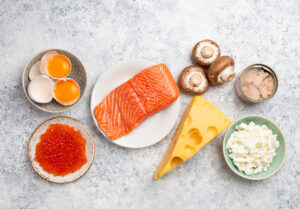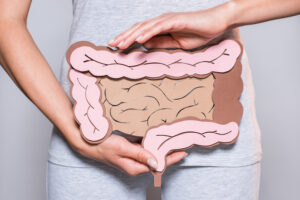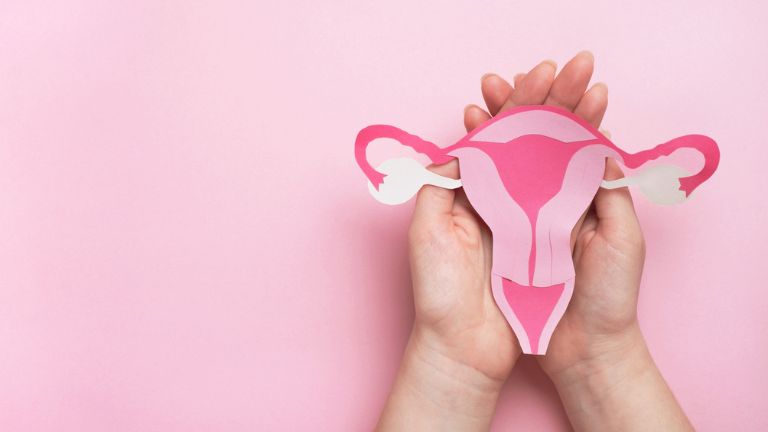Hot flushes, night sweats, vaginal dryness and more. Experts reveal 6 top tips to help ease debilitating menopause symptoms
As more women open up about the menopause, we are becoming more aware of the different symptoms and what we can do to help relieve them.
Whether you’re experiencing night sweats, cramps, hot flushes or vaginal dryness, the menopause no longer needs to be a scary and unknown time as there is so much available information and helpful remedies to help successfully keep the symptoms at bay.
The menopause no longer needs to be a scary and unknown time
We caught up with Women’s Health Expert, Dr Shahzadi Harper and Bio-Kult’s Technical Advisor, Hannah Braye for their top tips and go-to advice on how to ease menopause symptoms.
#1 Increase your Vitamin D intake
‘Your Vitamin D intake can play an essential role to reduce menopausal symptoms such as hot flushes, night sweats, sleep disturbance and poor concentration,’ explains Dr Harper.
‘Vitamin D deficiency has also been linked with low mood, which can worsen during perimenopause’.
Vitamin D intake can play an essential role to reduce menopausal symptoms such as hot flushes
There are plenty of supplements which contain Vitamin D including, Bio-Kult Brighten, £20.98 (also available to buy on Amazon). Brighten contains an advanced multi-strain live bacteria formula as well as vitamin B6, B12 and Vitamin D.
READ MORE: Best diet for menopause – an interview with Dr Clare Bailey

#2 Prioritise gut health
‘Research has indicated that having a diverse gut microbiome, with lots of different beneficial species is a key determinant for good health,’ says Braye.
In order to encourage diversity in the gut, through menopause and beyond, it’s recommended to:
1. Eat a wide variety of different plant foods. Recent research shows the more plants foods you eat (ideally over 30 different types a week), the greater the diversity in the gut, regardless of other dietary factors.
2. Eat plenty of foods high in prebiotic fibres, such as garlic, onions, shallots, leeks, slightly under ripe bananas, Jerusalem artichokes, asparagus and dandelion greens, as these provide a food source for beneficial species in the gut.
3. Introduce beneficial species to the gut by regularly consuming traditionally fermented foods such as kefir, live yoghurt, kimchi, sauerkraut, kombucha and miso. These tend to be particularly high in beneficial Lactobacilli and Streptococcus species.
4. Increase your intake of polyphenol rich foods such as berries, green tea, raw cacao, cloves, star anise and other herbs and spices. Polyphenols are packed with antioxidants and are associated with numerous potential health benefits, including increasing beneficial species as well as inhibiting pathogens.
5. Reduce your exposure to environmental toxins by eating home-grown or organic where possible, filtering your water, and using natural skin care and home cleaning products.
READ MORE: 4 ways the menopause affects your skin

#3 Have a consistent bedtime routine
‘During the menopause, it is common to experience trouble sleeping,’ explains Braye.
‘In order to improve your chances of getting a better night’s sleep, I would recommend introducing a regular bedtime routine, by getting up and going to bed at the same time each day.
‘Ensure your bedroom is dark and cool enough, this is especially helpful for hot flushes and night sweats. Also avoid screen use for at least an hour before bed or keep electronic devices out of the bedroom altogether, as blue light from screens can disrupt the sleep/wake cycle.
Ensure your bedroom is dark and cool enough
‘If you struggle to switch off, take steps to reduce stress, such as signing up to a mediation or mindfulness course, cognitive behavioural therapy, or restorative exercise such as yoga.
‘Prioritise carving out time for yourself, even if just 15 minutes to take a bath, go on a slow walk, read a book or do some deep breathing exercises as part of the winding down process’.
READ MORE: 10 menopause symptoms myths debunked

#4 Take steps to ease vaginal dryness
Vaginal dryness is very common and can occur at different times throughout our lives. From drops in oestrogen, anxiety, irritants, childbirth, breastfeeding, and ageing.
‘Due to the drop in the oestrogen hormone in perimenopause and menopause, it means less lubrication, which again can cause pain during sexual intercourse and can be prone to infections,’ says Dr Harper.
‘Eating certain foods, wearing softer and more comfortable underwear, and using moisturisers and natural lubricants, are all different ways to ease dryness’.
It is thought that the vaginal microbiota is mostly formed by translocation of microbes from the rectum. The intestines act as an extra-vaginal reservoir for both lactobacilli and pathogenic microorganisms.
In addition, our gut bacteria play a key role in supporting the immune system (70% of which resides in the gut), helping it fight infections anywhere in the body.
our gut bacteria play a key role in supporting the immune system
‘One of the best ways to support genitourinary health is therefore to improve the composition of bacteria in the gut by increasing beneficial species and decreasing pathogens,’ explains Braye.
‘Pathogen viruses can also enter the body through mucous membranes in the vagina, which can also become inflamed from bacterial and yeast infections caused by the imbalance of bacteria during the menopause.
‘Supporting the health of mucous membranes is therefore also important for vaginal health as is supporting the immune system to help fight infections.
‘This can be done by ensuring an adequate intake of certain key nutrients such as, Vitamins A, D, C and Zinc – important for both membrane and immune defences.
‘In terms of reducing discomfort, I would recommend avoiding certain soaps and chemicals, which can affect the vagina microbiome and PH level.
‘For those who find that they suffer from excessive redness or itching, I recommend taking a supplement such as Bio-Kult S. Boulardii, £15.98, also available to buy on Amazon.
‘Unlike other Bio-Kult products, Bio-Kult S.Boulardii contains a live yeast culture (Saccharomyces Boulardii) as well as Vitamin D3, a dual source of fibre which helps to feed and stimulate the growth of beneficial bacteria and PH.’
READ MORE: Perimenopause – a doctor’s guide to facing it the natural way

#5 Be wary of smoking and alcohol consumption
Use of tobacco and alcohol has been shown to potentially affect the age of on set menopause and the severity of symptoms.
For example, it has been observed that women who smoke 14 or more cigarettes a day enter menopause on average 2.8 years earlier than women who do not smoke.
‘This is another good reason to quit if you are a smoker, and to keep alcohol consumption below the Government’s recommended 14 units a week (approximately 1.5 bottles of wine),’ suggests Braye.
READ MORE: Menopause symptoms making you miserable? These natural fixes will help

#6 Try your best to have a positive mindset
Research indicates that women with a more negative attitude towards menopause are associated with more frequently reported symptoms compared to women with a positive attitude.
‘Engaging in a daily gratitude practice, whereby each day you think of three things you are grateful for, (including your health and body) has been shown to have a positive impact on mental health and out-look,’ reveals Braye.
shown to have a positive impact on mental health
Unfortunately in recent years menopause has been viewed with negativity, and treated almost like an illness, which is unhelpful. Instead, the transition to menopause can be a time of reflection and inspiration.
Although transitions of any kind can be inherently difficult, many women experience a newfound sense of freedom and personal growth in their menopausal years.
Like this article? Sign up to our newsletter to get more articles like this delivered straight to your inbox.



















































